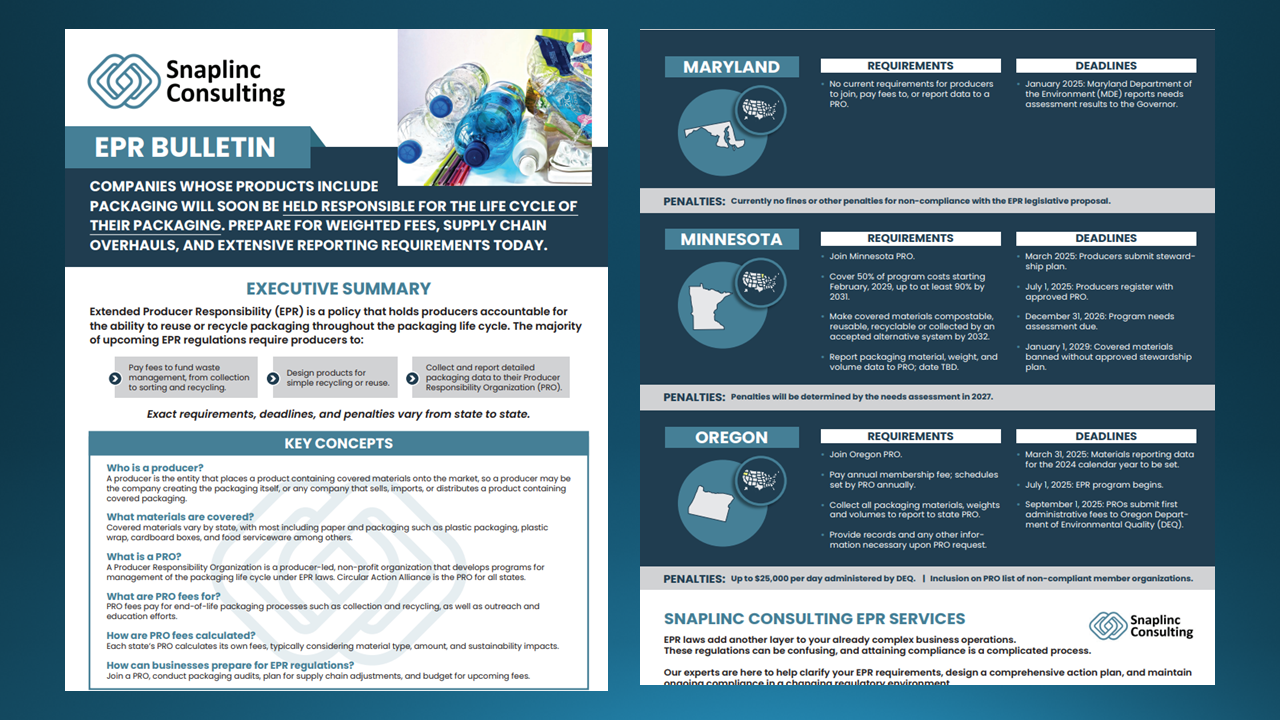Your 2024 PFAS Playbook
What steps should your brand take to prepare for 2025’s PFAS legislation?
Background
Many individual U.S. states (including California and New York) have created their own PFAS regulations. The first of these will go into effect in January 2025. To ensure your supply chain is compliant and avoid penalties, we recommend checking off the following steps as soon as possible:
Action Items for Brands
Take stock of products, locations, and timelines.
We recommend mapping out what you're selling and where to comply with state-by-state regulations.
Determine which products currently contain PFAS.
Some items may quality for an exemption for use in “severe wet conditions.” Determine if your products qualify and how to label them on the web and product tags.
Make a plan to utilize PFAS-containing inventory.
This could include selling prior to regulation enforcement or determining how to sell in unaffected regions.
Compliance varies by product category and selling region.
Develop a testing program.
Your suppliers aren’t perfect. Develop a surveillance testing program.
Implement reporting structures.
The EPA’s Toxic Substances Control Act mandates PFAS reporting in 2025 with different timelines and requirements for firms of various sizes and sectors.
Develop detailed recordkeeping structures now to ensure smooth reporting in 2025.
Assess drop ship programs.
Ensure drop ship programs will remain compliant, not allowing customers in an affected region to order a restricted item through a retailer.
Dial in messaging.
Customer-facing messaging must be clear; educate sales teams and reps, brief customer service teams on the changes, and ensure clear, consistent messaging across web and print.
Connect with aftercare producers.
Integrate care and repair products into product performance education. Customers must know how to properly care for their new PFAS-free products to remain satisfied with their performance.
Engage with retailers.
California and New York require retailers to collect certificates of compliance from each brand. Connect with retailers in those regions to get proper deliverables before 2025 deadlines.
Action Items for Retailers
Develop certificate of compliance protocols.
If you sell in California or New York, assess which documents you will need to collect from brands.
Create a document collection and evaluation program to receive and organize these certificates.
Evaluate drop ship programs.
Work with brands to ensure drop ship programs remain compliant, not sending restricted products to customers in affected regions.
Dial in messaging.
Educate customer service teams, in-store teams, and managers on product changes.
Ensure messaging about PFAS-free or exempted products is clear and cohesive across web, digital, and print.
Craft inventory segmentation.
If needed, create segmentation to continue selling all products in unaffected areas.
Stock aftercare products.
Ensure weatherproofing and product care products are readily available.
Educate customers on the proper use of these products.
Who Is Affected
Retailers and brands that manufacture or sell PFAS-containing products in California, New York, or the growing cohort of U.S. states with PFAS restrictions will be subject to these regulations. Different regulations concern those selling within the EU.
When These Regulations Take Effect
Compliance is required by January 2025. Failure to comply will result in monetary fines and reputational damage.
Snaplinc Consulting Support
At Snaplinc Consulting we can streamline your journey towards compliance with expertise in sustainability and supply chain management. We offer services like gap analysis, policy development, supply chain auditing, training, and reporting assistance. The January 2025 deadline is critical, and non-compliance poses risks of hefty fines and reputational damage. Prompt action is not only a legal necessity but also an ethical commitment, enhancing your brand's integrity. Schedule a meeting below to start working towards compliance.
For more questions or to request a discovery call, contact us below.



